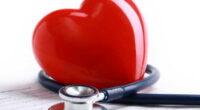High Blood Pressure (Hypertension) is a deadly health condition that can lead to stroke, heart failure, sexual dysfunction, eye problem, dementia, and kidney disease when not controlled or treated. Also read: 8 health problems uncontrolled high blood pressure can lead to
It is researched to be the major cause of premature death worldwide with one 1 in 3 adults leaving with it.
Hypertension happens when your heart pumps blood forcefully against your artery or blood vessel walls.
Usually, the reading is written as two numbers. The first (systolic) number represents the pressure in blood vessels when the heart contracts or beats.
While the second (diastolic) number represents the pressure in the blood vessels when the heart rests between beats.
For example, a Blood Pressure reading of 140 over 90, (140/90) is said to be high and harmful.
A number of studies have mentioned factors like genetics, age, lifestyle, sex, pregnancy, race, stress, and diet to be the cause of High Blood Pressure of which logical thinking and sensitivity have recently been added by The New England Journal Of Medicine.
Since Hypertension symptoms do not surface until it’s severe stage, it is important you go for a check-up regularly. Doing so will help you know your status on-time and what next to do.
What can you do to lower High Blood Pressure?
Just like many people often ask ” What’s good for High Blood Pressure?” Truth is, a lot is good for the Hypertensive but demands full adherence.
If after medical diagnosis your Blood Pressure is high, start by restructuring your diet menu with proper changes. Your diet must be good enough in order to lower your Blood Pressure.
Eat foods rich in fruits, vegetables, and low-fat dairy including foods low in saturated and trans-fats.
Also, reduce your salt intake (to less than 5g daily) by eating less half cooked or processed foods such as a packet, bottled or canned foods. These foods are unhealthy and thus should be avoided due to the high sodium content.
Sodium(salt) is found naturally in fresh foods like grains, fruits, vegetables, meats, nuts, and dairy products, with healthy salt quantity. So eat fresh homemade foods instead of processed foods.
What other ways can you lower High Blood Pressure?
Aside from improving your diet and cutting down foods high in sodium, fats or cholesterol, you can control or lower High Blood Pressure naturally when you;
Limit alcohol intake
Drinking a large amount of alcohol regularly can cause damage to your heart which may raise your Blood Pressure. Hypertension mostly affects people who exceed the weekly recommended volume of alcohol. The approved limits for adults is 14units per week – taking more than that could lead to High Blood Pressure.
Avoid or reduce tobacco use
Smoking or chewing much tobacco regularly can instantly raise your blood pressure readings at that moment. The chemicals in tobacco can harm the lining of your artery walls – causing your arteries to reduce and simultaneously increase your risk of heart failure.
Lose weight
Another effective way to control the pressure on your artery walls is through weight loss. With much weight, your heart works harder to pump blood around your body, which in turn raises Blood Pressure readings. Cutting down on your weight (a few pounds) could make a huge impact on your Blood Pressure readings and general well-being.
Exercise regularly
Being physically active is a great way to reduce the pressure on your artery walls. Exercising also helps you to lose weight faster and maintain good heart health. If you have hypertension, exercise for at least 150 minutes each week and monitor your Blood force readings as well.
Bath with hot water
Having a warm or hot bath is one best natural remedy for lowering High Blood Pressure. Warm shower naturally increases the body temperature and relaxes the muscles. It also helps to reduce the pressure on the blood vessel walls. Studies have shown that soaking in a hot tub for at least 10 minutes can lower your blood pressure readings. As a matter of fact, bathing hot water is also a good therapy for those with cardiovascular problems.
Sleep or go to bed on-time
You are probably not reading for the first time that “Blood Pressure is normally lower at night while you’re sleeping”. Thus, sleeping on time can make a big difference in your Blood Pressure readings. A research report from Daily Mail showed that High Blood Pressure can be brought under control by simply increasing sleep duration through sleeping on-time. The study further explained that going to bed an hour earlier than usual could help to ward off High Blood Pressure. Therefore, if you have hypertension, endeavour to have at least eight hours of sleep each night to improve your health condition.
Drink hot water.
Similar to having a warm bath, drinking a cup of hot water can help to calm your arteries and veins. That is, your blood circulatory organs are more effective when you take hot liquid. The presence of hot water in your body does not only increase blood circulation but lower High Blood Pressure and heart disease. So, make it a routine to drink a warm or hot cup of water first thing in the morning and the last thing at night if you’re hypertensive.
Eat foods rich in potassium.
Diet rich in potassium is very essential to normalizing Blood movement. Potassium is a vital mineral in the body that helps to balance the amount of sodium(salt) in your cells. Thus not eating enough potassium from your daily food could cause too much salt to store in your body which may lead to kidney failure, heart disease and then hypertension. To eat more potassium, eat plenty of fruits and vegetables high in potassium such as oranges, grapefruits, apricots, potatoes, sweet potatoes, cucumbers, papayas, leafy greens, bananas, cantaloupe, honeydew, dates, and mushrooms among many. Other foods you can source potassium from are wheatgerm, wholemeal pasta, fat-free yoghurt, fat-free milk, eggs many others.
Avoid chronic stress.
High levels of stress can strain the blood vessel walls and raise Blood Pressure temporarily. If stress continues for a long time, it may also trigger certain unhealthy habits that may become harmful to your heart health. Overeating, poor sleep, and misuse of drugs and alcohol are some of the bad habits that could further cause you serious Blood Pressure spikes. As a result, make out time to relax more and reduce stress drastically.
Change your sleep positions.
The two recommended sleep positions for the hypertensive by studies are face down and sleeping on the left side. A study showed that a change in sleeping position may reduce your High Blood Pressure.
According to Sleep Specialist, and Medical Director of the Martha Jefferson Hospital Sleep Medicine Center, W. Christopher Winter, the best sleeping position for High Blood Pressure patients are sleeping on the left side as it helps relieve pressure on blood vessels that return blood to the heart. Experts further explain that blood vessels are located on the right side of the body and may become compressed slowing your circulation if you sleep on your right side.
They also recommended sleeping on the left for pregnant women with Blood Pressure condition. This is because, the growing baby in the womb rests against internal organs which may cause circulation problems. So sleeping on the left side will help with circulation and may prevent Hypertension.
Different from the first recommendation, research by Yasuharu Tabara and his colleagues from the Ehime University School of Medicine in Ehime, Japan, suggested that sleeping face down may help lower the pressure on your blood vessel walls. Findings from their study suggested that Hypertension readings may drop by more than 15 points when you change from sleeping face up to face down.
Take pawpaw leaves tea.
Like pawpaw fruits, papaya leaves helps to keep your Blood Pressure within a normal range. A cup of papaya tea supplies about 781 mg of Potassium which when mixed with other potassium giving foods will amount to the daily dose of 4,700 mg approved by The American Heart Association.
Socialize and go for outdoor events.
Loneliness is particularly common among older adults. Research showed that social circle shrinks, as you age which makes it more difficult to have meaningful interactions with others. Based on that, it is important you attend social functions or events and then get social, it can help lower your readings. As a matter of fact, social interaction brings calmness to your body system and decreases blood clots in your arteries – reducing the potential risk for stroke and heart failure.
Stay mindful.
Through regular meditation, you can achieve mindfulness. Meditation helps to calm your arteries and take your mind off stressful situations while improving your heart health. According to Harvard Medical School, “a meditation practice supports your heart in many ways — from changing how you cope with stress to lowering Blood Pressure. Therefore meditate more to have peace of mind and in turn lower your Hypertension readings.
Eat more magnesium-rich foods.
Magnesium helps the blood vessels to relax, not getting enough can lead to several health problems including Hypertension study says. Experts, therefore, recommend you eat more magnesium-rich foods to reduce High Blood Pressure. To source magnesium, add vegetables, dairy products, legumes, chicken, meat and whole grains into your diet daily.
Final note…
Hypertension is a serious medical condition that significantly increases the risks of heart, brain, eye, and kidney disease including stroke and sexual dysfunction.
Blood pressure readings that are consistently 140 over 90, are considered high and deadly if control measure is not taken early enough.
According to World Health Organization, about 1.13 billion people worldwide have hypertension, most (two-thirds) living in low- and middle-income countries.
Hypertension can be controlled by improving your diet, particularly by cutting down on foods high in salt, and cholesterol.
Also, making little lifestyle changes can help improve your condition faster than you imagined!
So, if you have hypertension, following the suggestions above alongside regular check-up may help improve your condition.









